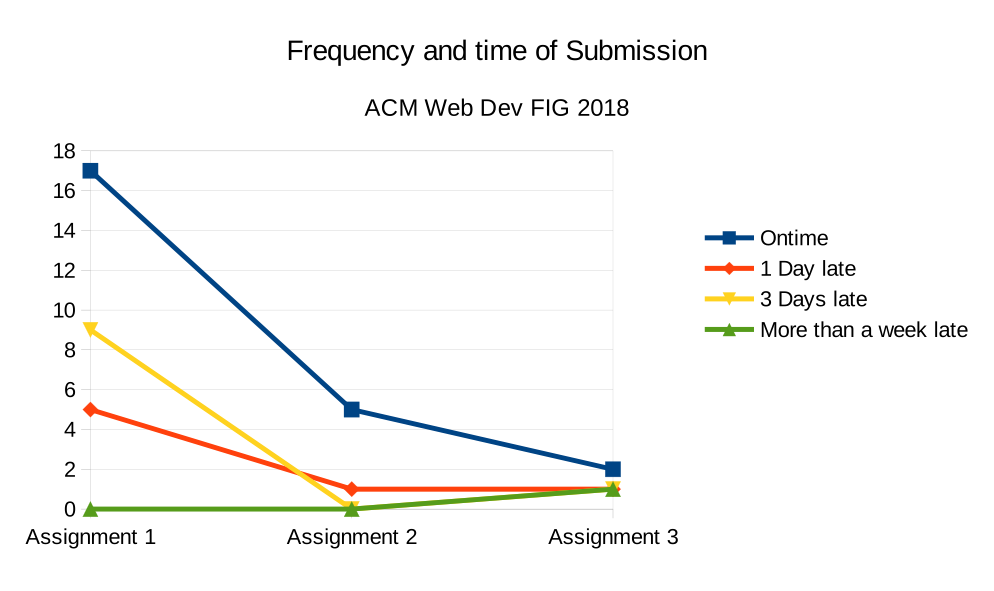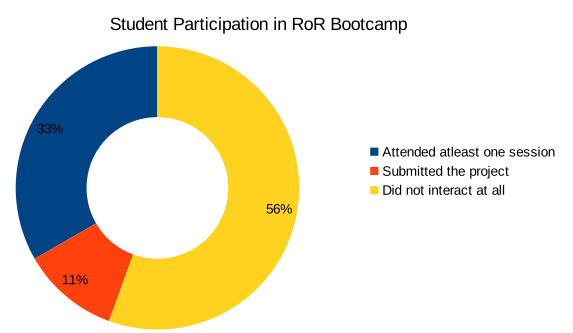How To Teach Better
As the club recruitment season is in full swing, people passionately argue on their club rankings. The discussion will be more increasingly dogmatic as they become members. A common talking point for me - Teaching opportunities is the reason I prefer ACM over all other exclusive clubs.
So far, none of the teaching and mentoring outlets like FIGs, SMPs and one-off workshops have satisfied me. I never walk out, feeling I have learnt something new and important, something which I couldn’t have possibly figured out on own.
I have been pondering on this topic possibly since the first semester. I explored my ideas in the Professional Communication assignment (referenced below) in the second semester.
I thank ACM Saahitya for giving me a stage to present my ideas. :)
Case Studies
I will be referring through out the article to the following case studies - ACM Web Development FIG, RoR Bootcamp.
ACM Web Development FIG
ACM Web Dev FIG was held in odd semester of 2018-19 by ACM, to teach frontend development. The workshops followed this pattern: New concepts and ideas were introduced, using real life code examples of work they did. Later, Students were given assignments to practice and demonstratre their skills.
Organizers planned 10-12 sessions but could conduct only three. The FIG was closed, citing low participation as the primary reason.
The graph demonstrates that number of submissions decay exponentially as the FIG went on.
Law of Participation: Number of participants decay exponentially as the duration increases.

Ruby on Rails Bootcamp
RoR Bootcamp was conducted over winter break in 2018 by IRIS to introduce backend developent. Organizers would go through topics in frequent online sessions and students were required to submit a minor project to showcase their new skills.
Out of 80-90 students enrolled, the project was submitted by only ten participants. The graph shows different levels of participation. An overwhelming majority (88%) didn’t finish the final project.
Volunteer Paradox: Even in a group of volunteering participants, nearly half will not interact in a meaningful manner.

The Students Must Be Lazy!
That makes sense, right? If the students cannot even show up for the sessions and submit assignments on time, how can we even teach them in an effective manner?
While this is an appealing line of thought, this merely shifts the blame onto students. It also shields us from criticism, and removes any kind of feedback process we could have.
On a broader note, this is what seperates good and bad people to work with. Good people are willing to work with, adjusting and accommodate the others viewpoints. They realize their imperfect nature and are open to improvements. While bad people lay down unrealistic (and unchanging) expectations. They react negatively to criticism, since it’s never their fault.
What’s Wrong, Then?
Focus on What’s Hard to Teach
It’s hard to teach. There are no doubts about it. It’s public speaking with the added pressure of making sure everyone learns.
In such circumstances, it’s understandable for a teacher to hide behind a topic that’s easy to explain. But that’s wasteful of everyone’s time.
The first two month of Physics course in first year were of mechanics. It was absolute hell for me. The questions were boring, the theory easily understood. I had 76% attendence in that class. I have been taught boolean algebra four times by now. I am gonna lose my shit if someone ambushes me with a K-map.
Then, there was a workshop which takes the cake for this. It was about one of my favorite tools and to give you an analogy:
Imagine you are a guitarist, and you see another guitarist with the same guitar model as you playing in public. You are obviously interested to hear them out.
They suck horribly. They are playing a novice level tune and still make it sound more like a drum. You are embarassed. Is that how people see me too? You are angry, even. Because they are ruining the reputation of your guitar.
To date, that is the only workshop I walked out of, half way through.
Structure your content to spend time on topics unknown to your students. Review the student’s understanding using tests and assignments.
Give Feedback on Assignments
I was once part of a workshop, and their assignment had some optional questions to do as well. I was eager to both learn some skills and impress the mentors, so I finished it some 3-4 days before the deadline with the optional questions. I waited a day, and then other. I was hoping for some kind of response, critique or appreciation of work. The deadline passed too, yet no response. Then, the assignment was merged in their repository and that was it.
I felt my efforts were invalidated. To this day, I am not sure if anyone has reviewed it or not. Then the next assignment rolled around, I thought, “Just the bare minimum of the efforts for you, since it’s not going to matter anyway.”
Then, there’s this happy example too: There was a Reverse Engineering Workshop by Adwait Gautham. I missed the first, but caught up through the online material. The second session had an attendence of 5, including him. It was embarrassing for all. I felt bad for him, and went back hostel. I emailed him the answers of first assignment along with a few doubts and had a nice interaction with him. Great guy. I enjoyed the workshops, although it was scrapped without a third session.
Due to our interaction, I wanted to learn more about the topic than I had before. That’s impressive.
Dedicate time for feedback before the deadlines. Have multiple rounds of reviews if time permits.
Have Tangible Rewards
All teachers struggle with getting a range of students to interact in class and learn. Consider John Guttag, a professor at MIT who throws candies to students who try to answer. His classes are lively and the students get competitive over the candies easily.
It would have been amazing if people were motivated by the pursuit of knowledge itself. But that’s not the world we live in.
A simple way to encourage certain behaviours is to associate the behaviour with a reward.
Have small, tangible rewards in class and for assignments.
Build Towards A Large Goal
One of the difficult parts mentors face, is to convince students that’s it’s a worthwhile effort. It takes a lot to push people out of their comfort zones and mindless entertainment.
Having a large goal at the end helps to convince. It also forces you to think in terms on the content you want to cover.
Theatrics is a good idea.
For example: I want to take a Web Development FIG sometime. Here’s what I have planned as the final assignment: A site for the complete club recruitment process.
It’s going to be push them hard. However, once they finish it, there will be an immense sense of pride and achievement.
Be Enthusiastic
It’s hard to be enthusiastic about the topics when the teacher are not excited at all. Lack of enthusiasm and apathy shows up as a lack of effort and everything crumbles around it.
I have been excited to talk about this topic and to teach in general, which I hope can be seen through my efforts. Such excitement inspires others.
I want my legacy to reflect the care and efforts I took. I want to inspire people and make a positive change.